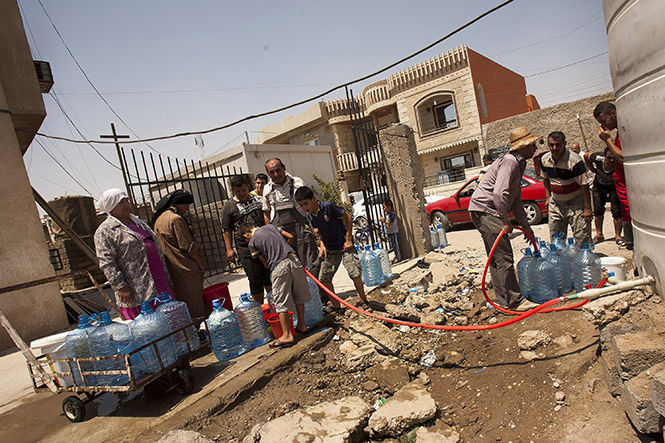UN backs inquiry of Islamic State group’s alleged crimes
People line up to get water from a common well in Bartella, Afghanistan. Northern Iraq Christians have reason to worry about the self-proclaimed Islamic caliphate and many are seeking a safer place to live.
GENEVA (AP) — The United Nation’s top human rights body on Monday overwhelmingly approved the Iraqi government’s request for an investigation into alleged crimes against civilians committed by the Islamic State group in its rampage across northeastern Syria and parts of Iraq.
Diplomats agreed by unanimous consent to approve a nearly $1.2 million U.N. fact-finding mission at a daylong special session of the 47-nation Human Rights Council about Iraq and the extremist group.
Iraq’s request for the U.N. to investigate alleged abuses by the Islamic State was included in a resolution that more broadly condemns the group’s severe tactics but also calls on Iraq’s government to protect human rights.
Its aim is to provide the Geneva-based council with a report and evidence next March that could shed further light on Iraqi atrocities and be used as part of any international war crimes prosecution.
The session Monday focused on the threat posed by the militants, who have seized cities, towns and vast tracts of land and carried out a number of massacres and beheadings.
“We are facing a terrorist monster,” Iraq’s human rights minister, Mohammed Shia’ Al Sudani, said shortly before the vote.
He said his country needs the world’s support because the group “is not an Iraqi phenomenon, it is a transnational organization that is an imminent danger for all countries of the world.”
“Their movement must be curbed. Their assets should be frozen and confiscated. Their military capacities must be destroyed,” he said.
Diplomats convened after the U.S. launched a series of airstrikes to prevent the group from advancing on the Kurdish regional capital of Irbil and to help protect members of the Yazidi minority who were stranded in Iraq’s northwest.
In Geneva, U.N. officials expressed grave concern Monday at the reported atrocities in Iraq committed by both sides.
Flavia Pansieri, the U.N. deputy high commissioner for human rights, said the militants’ widespread, systematic persecution of ethnic and religious groups likely amounts to a crime against humanity. She said Iraqi government forces’ execution of detainees and its shelling of civilian areas may also amount to war crimes.
Keith Harper, the U.S. ambassador for human rights in Geneva, told the council that as a co-sponsor of the Iraq resolution the U.S. is appalled at the “heinous acts” by the Islamic state that include extrajudicial killings, enslavement, deliberate targeting of civilians, sexual assault, and religious persecution.
He also pointed a finger at the Iraqi government.



